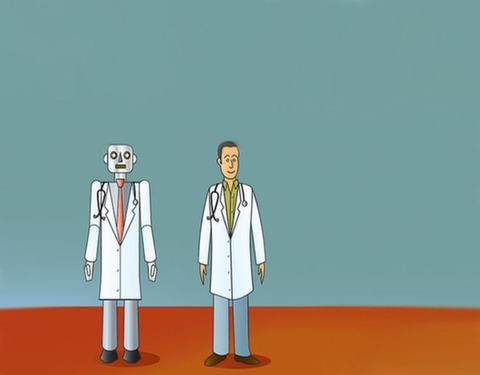EHR Vendors: Step Up Your Game
Electronic medical record vendors need to take a clue from video game design. It's time to deliver intuitive, simple to learn, and easy to use EHR technology.
July 24, 2014


10 More Robots That Could Change Healthcare
10 More Robots That Could Change Healthcare (Click image for larger view and slideshow.)
Dear Heath IT Vendors: The time is now. I urge you to open your platforms, enhance your APIs, encourage sharing of data, and adopt standards. Let's foster a new era of innovation.
As chief IT strategist for Montefiore Medical Center, a New York-based academic medical center and university hospital for Albert Einstein College of Medicine, I focus on understanding our clinical and business needs and deploying system enhancements that provide practical, targeted IT solutions. I've been doing this for 25 years, but we still face many of the same problems we did a quarter-century ago.
Hospital systems are investing hundreds of millions of dollars in an electronic medical record (EMR) system that physicians and other eligible providers are not flocking to use. Why is this the case? Why do some clinicians complain the system gets in the way of treating their patients? Why is it difficult to train clinicians on how to place an order or print a barcode for a blood draw? From a patient perspective -- and as consumers of what has been referred to as the world's most expensive healthcare system -- is it too much to ask for access to a longitudinal medical record?
Why do we put up with it? This is particularly baffling when after a day of evaluating how we can leverage technology to improve patient experiences, I come home to find my son playing video games that put to shame almost any technology I've seen focused on engagement.
[Another call for reform: Standardize EMRs, For Security & Safety's Sake.]
Let's take gaming as an example. The worlds our kids manipulate are far more complicated and intense compared to placing an order for a lab or radiological procedure. Yet even the most inexperienced game player can operate these worlds without hours of training or reading any manuals. The simple reason is that gaming designers spend a great deal of time sharing insights and thinking about the real-life context in which people play the game before the design process even begins. They understand it is all about user experience, and usability will always trump the best and fastest technology. We should be mirroring this experience.
Now is the time to usher in a new era of innovation. Healthcare is changing. We are moving to a fee-for-performance model that encourages a collaborative process involving public- and private-sector stakeholders and shared decision-making between patients and providers. The need to disclose relevant health and population data seamlessly is critical. In an accountable care organization (ACO), it's paramount that we have access to the complete patient record.
To our vendors' credit, they have implemented more systems, incorporated more security, and delivered more mandated functionality than ever before. Still, with all the advancements, the user experience lags. It is time to learn from other industries and incorporate technology from outside traditional healthcare IT. It is a necessity for us to deliver an exceptional user experience and the interoperability required for us to improve quality and reduce the cost of healthcare.
Imagine the possibilities if EHR vendors transform their closed and proprietary systems into open platforms, similar to the iTunes store or Google Play, so startups and seasoned vendors could provide input and build upon what exists. The opportunity would quickly attract the attention of many healthcare incubators and accelerators that have sprung up across the country and across the world. Such an open EHR platform has the greatest potential for transforming healthcare, in a way similar to what antibiotics did for medicine.
I have seen more healthcare IT accomplishments during the past five years than the preceding twenty, so I am optimistic we can begin to learn and take advantage of the progress made in other industries.
We must get moving though! Advancements and innovations in technology are here -- wearable biosensors, mobility, social media, and, yes, Google Glass are already entering operating rooms. This is just the beginning. What is to come in the next 20 years seems to be limited only by antiquated barriers and our imaginations. Don't you agree?
The opinions expressed here belong to Mony Weschler and do not necessarily reflect those of Montefiore Medical Center.
Our InformationWeek Elite 100 issue -- our 26th ranking of technology innovators -- shines a spotlight on businesses that are succeeding because of their digital strategies. We take a close at look at the top five companies in this year's ranking and the eight winners of our Business Innovation awards, and offer 20 great ideas that you can use in your company. We also provide a ranked list of our Elite 100 innovators. Read our InformationWeek Elite 100 issue today.
About the Author
You May Also Like






